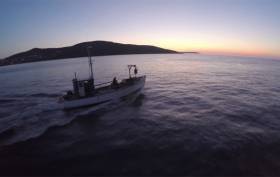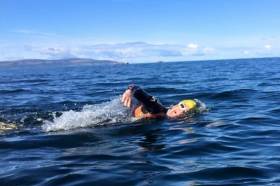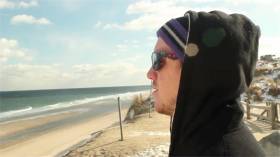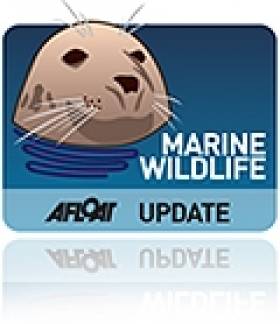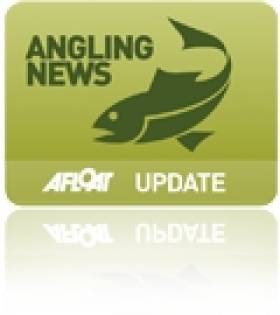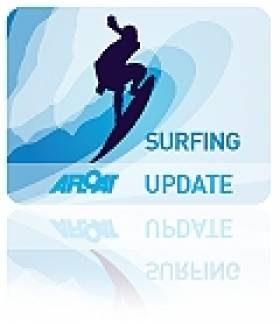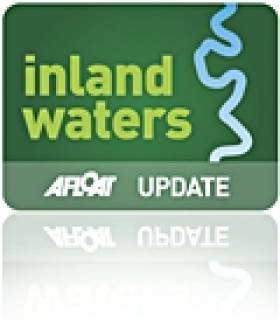Displaying items by tag: documentary
#Documentary - A new documentary from the maker of The Pipe takes on the powerful interests "carving up" Ireland's ocean resources.
Opening in Ireland on 29 April, Risteard Ó Domhnaill's Atlantic is narrated by Emmy Award-winner Brendan Gleeson, and was awarded the Best Irish Documentary prize at the recent Audi Dublin International Film Festival.
Shot across Ireland, Norway and Newfoundland in Canada by Scannáin Inbhear/Inver Films, Atlantic expands upon the controversial subject matter of his previous film – the experiences of Rossport residents opposed to Shell's prospect in the Corrib gas field – to tell a wider story of threats to coastal communities not only in Ireland, but around the North Atlantic Rim.
Atlantic follows the fortunes of three small fishing communities as they struggle to maintain their way of life in the face of mounting economic and ecological challenges.
'Atlantic' - the race for the resources of the North Atlantic from Risteard O Domhnaill on Vimeo.
As the oil majors drive deeper into their fragile seas, and the world’s largest fishing companies push fish stocks to the brink, coastal people and the species they rely on may be reaching a point of no return.
In Norway, fishermen and their resource have historically been aggressively protected by national authorities. But as oil fields dwindle and the country now looks to add to its reserves, Arctic cod fisherman Bjornar Nicolaisen is campaigning against seismic testing by the oil explorers criss-crossing his fishing grounds.
On the outer edges of Norway’s five-star economy, seismic blasting is threatening to blow Bjornar’s livelihood out of the water.
Across the ocean in Newfoundland, where an oil boom has hit, fisherman Charlie Kane will likely be the last of his generation to work the sea, after a cod fishing ban in the 1990s brought a world-renowned industry to a halt overnight.
Charlie is thankful his sons can now make a good living on the oil rigs, and won’t need to toil in small boats on Newfoundland’s perilous Grand Banks. But now, as oil prices plummet, their village is once more taking on water, as the the quick money of the black gold rush begins to run dry.
Meanwhile, in the West of Ireland, Jerry Early has seen the heart ripped out of his island after a ban on drift netting for wild salmon. As he fights to regain his fishing rights, and as foreign super-trawlers operate with impunity just offshore, Jerry feels like a criminal on his own boat.
The circumstances could be dire if he defies the 'new order of the ocean', but as the unofficial 'mayor' of a dying island, Jerry feels he has to face up to powerful interests before it’s too late.
Filmed in some of the most remote and breathtaking locations in the North Atlantic, and at close quarters with some of the sea’s most captivating characters, Atlantic brings the very personal stories in the vital resource debate to the fore, exploring how three modern-day communities must learn from the past in order to secure a brighter future.
Risteard O’Domhnaill said of his new film: “My last documentary, The Pipe, told the story of a small coastal community as they faced down one of the world’s most powerful oil companies, which was forcing a high-pressure raw gas pipeline through their farms and fishing grounds.
"The story raised more questions for me than it answered, leading me to look at the politics of our oil and gas prospects off the Irish coast. What has since unfolded is an incredible story of resource mismanagement, and the capture of our offshore riches — oil, gas and fishing — whilst our gaze is elsewhere.
“Unfortunately, what I found when I looked across the Atlantic is that Ireland’s tale is not unique. However, in both Norway and Newfoundland, the lessons learned by similarly affected communities can help us to chart a different course, before our most renewable resources are damaged beyond recognition, or sold to the highest bidders.”
Commenting on his involvement, Brendan Gleeson said: “Atlantic is an engrossing piece of truth-seeking, visually stunning and crafted with clarity and insight. It was an honour to be involved.”
As previously reported on Afloat.ie, Atlantic started as an ambitious crowdfunding project, but is now backed by Bord Scannán na hÉireann (The Irish Film Board), the Canadian Broadcasting Corporation, the Newfoundland and Labrador Film Development Corporation and Nordnorsk Filmsenter (the North Norwegian Film Centre).
The feature-length documentary opens in Dublin exclusively at the Irish Film Institute on Friday 29 April, with director Risteard O’Domhnaill joined by Arranmore and Rossaveal shermen for a discussion following the 8.30pm screening on the first night. For more see the official film website HERE.
Galway Bay Swim Subject Of New Documentary
#GalwayBaySwim - A documentary celebrating 10 years of the Galway Bay Swim had a special screening in the City of the Tribes this week to mark the launch of the 11th charity swim this July.
As Galway Bay FM reports, the documentary was directed by local filmmaker Pat Comer and pays tribute to the hundreds of swimmers who've taken to the water at Auginish and crossed the bay to Blackrock Diving Tower in Salthill since 2006 in honour of the late Frances Thornton and to raise finds for cancer support.
"The documentary really captures the essence of the swim and everyone that takes part in a voluntary or swimming capacity," said David O'Donnell of Cancer Care West.
Registrations open this Sunday 20 March for the 11th swim, scheduled for Saturday 23 July. Galway Bay FM has more on the story HERE.
World Premiere For Surfing Documentary In Dingle Next Weekend
#Surfing - A new documentary following two American descendants of the 'King of the Blaskets' as they surf the waves of their ancestral homeland will have its world premiere in Dingle next weekend.
The Crest will be screened as part of an eclectic programme at the Dingle International Film Festival at 6pm on Saturday 19 March at the Blasket Centre (Ionad an Bhlascaoid Mhóir), and again on Sunday 20 March at 2pm in the Phoenix Cinema.
Directed by Mark Covino, whose last film was the award-winning music documentary A Band Called Death, The Crest follows the exploits of cousins Andrew Jacob and Dennis 'DK' Kane as they trace their shared ancestry back to the Blasket Islands.
A rare stronghold of traditional Irish culture over the centuries, the rocky island chain is where their great great grandfather once presided as 'An Rí' - the king of the islands.
One of his responsibilities to the isolated community was to row the treacherous Atlantic seas to the mainland on the Dingle Peninsula for supplies.
His was a seaworthiness that seems to have carried on through the generations, as both Jacob and Kane are surfing enthusiasts to the professional level.
It's only natural, then, that they would explore their bloodline by putting themselves in their regal ancestor's shoes – or rather waters.
See the trailer for The Crest below:
Humpback Whale Documentary Continues Library Tour
#MarineWildlife - The Humpback Whales of Cape Verde will continue its screening tour of libraries throughout Ireland from next month.
As previously reported on Afloat.ie, the documentary that follows marine wildlife expert Dr Simon Berrow's decade-long study of Atlantic humpbacks – a number of which frequent the Cork coast every year – had a special screening in Clonakilty earlier this week.
That comes after previous showings in Killarney on 23 January, and Dun Laoghaire's new Lexicon on 12 January.
The library tour continues in February with stops across the country scheduled up to summer. Future free screenings are as follows:
- 10 February – Kilkee – 6.30pm
- 25 February – Youghal Library – 7.00pm
- 5 March – Maynooth Library – 3.00pm
- 5 April – Carraroe – 6.00pm
- 14 April – Ballyroan Library, Dublin – 7.00pm
- 21 April – Dungarvan Library – 7.00pm
- 10 May – Ballinasloe Library – 7.00pm
- (Dates in Skibbereen in March and Bray in May are TBC)
Round Ireland Kayak Documentary Up For 'Outsider' Award
#Kayaking - The film of kayaking duo Jon Hynes and Sean Cahill's 38-day round-Ireland adventure last summer has been nominated for an Outsider Magazine award.
As previously reported on Afloat.ie, the 45-minute documentary Sea Kayak Around Ireland tells the story of Hynes and Cahill's incredible circumnavigation of Ireland's 1,500km of coastline in all its rugged beauty.
First screened as a fundraiser in Cork last November, the film is now available to watch on YouTube.
And as Hynes told Anton Savage on Today FM yesterday, it has even been nominated for Adventure Movie of the Year in Outsider's 2015 awards – with voting still open to the public via social media.
Hynes and Cahill also made the long list for the 2015 Outsider People of the Year prize alongside fellow intrepid kayakers Susan Honan and Sonja Ewen.
Ireland's First Surfer Subject Of New Radio Documentary
#Surfing - He's the Irish surfing hall-of-famer who "came out of nowhere".
And now Joe Roddy is the subject of a fascinating radio documentary about his decades of aquatic exploits and ingenuity on Newstalk, both online and broadcast tonight (Saturday 23 January) at 10pm.
As TheJournal.ie reports, Surfing at the Crossroads brings the now 80-year-old Roddy to Valentia Island, where he recounts building what's regarded as Ireland's first surfboard – way back in the 1940s.
But even before then he was assembling his own makeshift vessels and gadgets to enable him to go canoeing, snorkelling – even spear-fishing.
The latter of which Roddy excelled at enough to represent Ireland at the World Championships in Cuba in 1967 - recording a incredible 32-metre dive in the process.
TheJournal.ie has much more on Joe Roddy's story HERE.
Surprise Basking Shark Features In Cape Clear Documentary
#MarineWildlife - Do you remember the basking shark that surprised a group of bathers off Cape Clear last summer?
According to TheJournal.ie, it's now featured in a documentary shot on the fly by a team of quick-thinking filmmakers.
Aonrú, a film funded by Cork County Council and Bord Iascaigh Mhara, tackles the delicate subject of the West Cork island's future after the decline of the regional fishing industry.
But in the process of filming, they happened to be close by when the basking shark - the second-largest fish in the oceans – made its appearance, the solitary beast almost a metaphor for the island's dwindling community.
TheJournal.ie has more on the story HERE.
Cork Angling Documentary Makes The Film Festival Rounds
#Angling - A short documentary on top fly-fishing name Glenda Powell is garnering plaudits at film festivals around the world.
And as Ellie O'Byrne writes in the Irish Examiner, the film sprang out of an article on the world-champion fly-caster for that very newspaper by ecologist Carl Dixon.
Unwinding is a five-minute short that illustrates Powell's love of angling on the River Blackwater and the nature that surrounds her as she casts her flies.
Inspired by Powell's story after an assignment for the Examiner in 2011, Dixon explains how he completed a filmmaking course to learn the ropes before taking up the camera for the €800 micro-budget film.
And it seems his dedication has paid off, with film festivals as far afield as Washington and California including the short in their selections.
The Irish Examiner has more on the story HERE.
Easkey Britton's Pioneering Surf Trip To Iran Inspires New Film
#Surfing - The inspirational story of Easkey Britton's pioneering surfing trip to Iran is now part of a new film exploring how the sport is empowering women in the Middle East.
Two years ago, Afloat.ie reported on Britton's adventures in southern Iran, where she was filmed by French documentary maker Marion Poizeau as she took to the waves in a full-length 'hijab swimsuit' – becoming the first woman to surf in the country's waters.
Since then she's set up Waves of Freedom, with the aim of encouraging the women and youth of the remote Baluchistan region of Iran to get into surfing.
And she's been joined by Poizeau, whose new documentary Into the Sea weaves Britton's story together with those of two women her trip inspired: Iranian snowboarder Mona and diver Shalha.
Both have taken Britton's lead in introducing surfing to everyone in Iran, but especially women and girls – sharing "a belief in the power of sport to break down barriers and connect with others".
The 52-minute films is available to download or watch on demand at Vimeo.
River Shannon Documentary Scoops Top Award At 'Green Oscars'
#RiverShannon - A documentary on the natural history of the River Shannon has won the top award at the 'Green Oscars'.
Originally broadcast on RTÉ television as The Secret Life of the Shannon, the film On A River In Ireland also took the gongs for best cinematography and best script at the 2014 Wildscreen Film Festival in Bristol.
The awards organisers described the winning film as “a beautifully conceived film where the script, photography, music and editing create a magical hour, reconnecting us with nature in a way that very few films do today.”
On A River In Ireland follows Colin Stafford Johnson on a journey along the River Shannon, the longest river in the British Isles.
The film was shot over two years and features extraordinary animal behaviour captured with the very latest camera technologies.
And it has already enjoyed great success, winning three awards at the Jackson Hole Wildlife Festival, including best overall film.
Speaking after the win, director John Murray said: “My father grew up on the banks of the Shannon and to me as a child it was as wide and mysterious as the Amazon.
"In this film we tried to capture some of the wild animals and natural wonders that lie unseen under our very noses. It’s hugely gratifying that a film featuring Ireland’s wildlife would win against all comers from around the world, and a huge thanks to the team and everyone who helped us around the country.”
On A River In Ireland was made with the support of RTÉ, the BAI, ESB, the National Parks and Wildlife Service, Waterways Ireland and the Heritage Council, and produced with the support of investment incentives for the Irish film industry provided by the Government of Ireland.



























